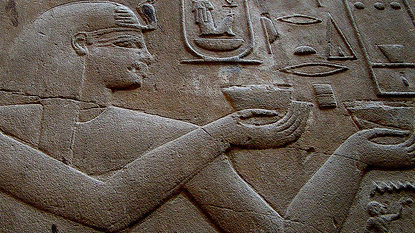THEBES, EGYPT
Despite considerable urging from Israelite leader Moses, the Pharaoh mentioned in the Book of Exodus refused to let the Israelites go because his “heart was hardened.” New evidence suggests that Pharaoh’s heart condition can be attributed to a mysterious fatty sludge known to Mennonites as Jreewe, the most artery-clogging substance ever discovered.
“Water was turned to blood; locusts ate all the crops; there was a plague of frogs…and he still didn’t listen. That guy must have eaten a heck of a lot of pork cracklings to get such a hardened heart,” remarked Dr. Ben Hamm of the Centre for Old Testament Research.
Archaeological artifacts seem to confirm Hamm’s theory. For example, Hamm points to ancient drawings that depict the Pharaoh in a ‘Keep Calm and Eat Bacon’ T-shirt. Additionally, recently uncovered hieroglyphs show that sometime during his reign, Pharaoh banned the worship of the sun god Ra and instituted a new religion dedicated to the worship of Jreewe. According to Hamm’s translation, the Egyptians bowed down in reverence to “the Lard your god.”
“He was Pharaoh, so he could have had his choice of meat,” said Hamm, “but instead of choosing the prime cuts, he chose to slather a thick layer of Jreeweschmolt onto a piece of toast each morning.”
Over many years, the Pharaoh’s excessive consumption of Jreewe led to arterial plaque and possibly angina pectoris, which made him unable to see the obvious moral imperative to free the slaves. Pharaoh is said to have finally relented when surgeons put a stent in his artery sometime after the tenth plague.
(Photo credit: by VasenkaPhotography/CC)
